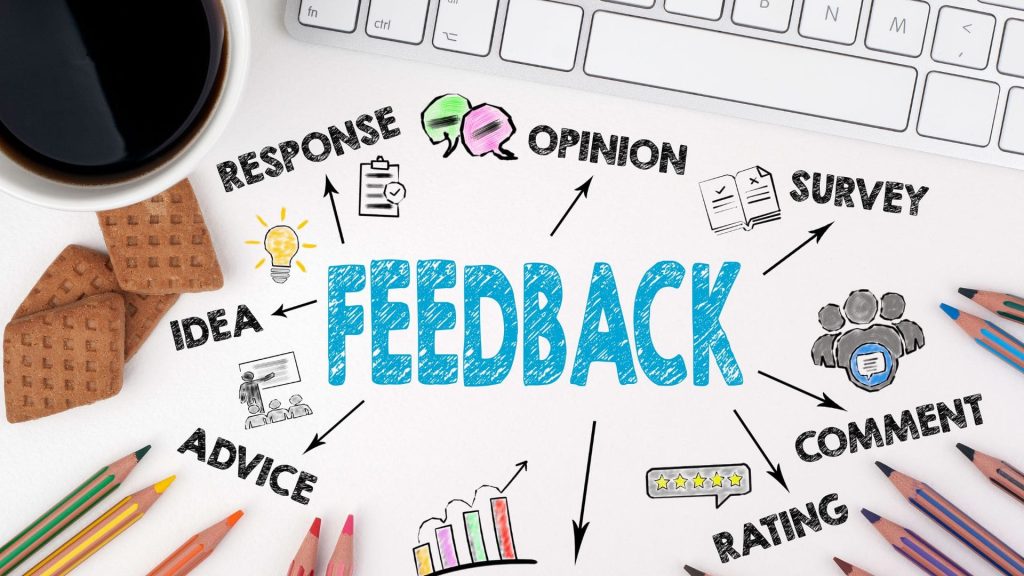
What's the Best Way to Receive Feedback Gracefully?
Positively giving feedback is very important as it can strengthen your relationship with your team and boost the overall growth of your company.
If not done properly, it can be disastrous!
You must have read a lot of tips and strategies for giving feedback. We have even written a comprehensive guide to it.
But has anyone ever told you about the importance of receiving feedback gracefully?
No?
I still remember the first time I had this discussion with my boss almost 15 years ago when I worked in a private consultancy. During my time in that company, we invested a lot of our resources in training our staff to give feedback, but never did anyone talk about how to receive feedback or criticism in the workplace. It was as if people should know by birth how to receive feedback.
When I expressed my concern to my bosses, they were kind enough to support my idea. They encouraged me to plan workshops for training staff members to receive feedback from their seniors and colleagues.
What did I learn?
Since then, I have been training aspiring leaders and have completed over 10,000 workshops. But even after this vast experience, I sometimes get shocked and simultaneously fascinated by the responses I get from people when they hear feedback.
I now understand that no matter how good one is at giving feedback, there is always a chance that the recipient will not love it. This can be because they are sensitive, inexperienced, unwilling to change, or emotionally weak. Different people have different personalities, so it is impossible to customize your feedback for everyone.
I think one should invest in training people to receive feedback rather than putting all efforts working on the giving side. In this guide, I am going to put a small effort into it.
Let’s Begin with the Basics!
Feedback is essential for continuous improvement. It helps identify strengths, uncover areas for improvement, and provides an external perspective on your performance.
Embracing feedback positively can lead to better job performance, stronger relationships, and personal growth.
Let’s discuss some important reasons why receiving feedback is so important.
What is the Importance of Receiving Feedback?
Receiving feedback is important for various reasons, including personal growth, professional development, and overall improvement. Here are some key reasons:
1.Boosts Personal Growth
Feedback provides an external perspective on your actions, behaviors, and performance, helping you understand how others perceive you. It highlights what you are doing well and what areas need improvement, allowing you to focus on developing specific skills.
2.Enhances Professional Growth
Constructive feedback can guide your professional development, making you a more effective and competent employee leading to promotions and career growth. Regular feedback helps you refine and acquire new skills, making you more versatile and valuable in your role.
3.Builds Stronger Relationships
Receiving feedback gracefully demonstrates that you respect the opinions of others and are willing to learn from them, fostering trust and mutual respect. Open feedback channels can improve team communication, leading to better collaboration and understanding.
4.Improves Workplace Performance
Feedback ensures that your efforts are aligned with the organization’s goals and expectations, improving overall performance and productivity. Timely feedback allows you to correct mistakes and adjust your approach before small issues become significant problems.
5.Promotes Learning
Feedback helps you stay adaptable in a constantly changing environment by continuously learning and updating your knowledge and skills. Constructive feedback can spark new ideas and innovative problem-solving approaches, driving creativity and progress.
6.Boosts Confidence
Positive feedback reinforces good behavior and performance, boosting your confidence and motivation. You must know that even when feedback is critical, it can be empowering when delivered constructively. This is because it provides clear guidance on how to improve yourself.
7.Encourages Accountability
Feedback holds individuals accountable for their actions and performance, encouraging a sense of responsibility and ownership over their work. It promotes a culture of professionalism where everyone is committed to maintaining high standards and continuous improvement.
Crucial Tips for Receiving Feedback in a Graceful Manner
Now that you have read why receiving feedback is important, please follow the strategies to accept it gracefully.
- Adapt a Positive Mindset
When receiving feedback, you need to make sure that you approach it with a positive and open mind. You must never dread it. Rather, you must consider it as an opportunity for growth. You must stay calm if you get negative feedback or criticism from your bosses. Take deep breaths to maintain your composure, and don’t treat the feedback as a threat.
- Listen to the Givers Actively
Active listening is very important as it helps you understand the feedback completely. You have to pay attention to the input without interrupting the person. You have to show that you are engaged with them. You can do it by nodding or by making noises that show affirmation. You can also ask questions if something is unclear, but only after the person has finished taking it.
- Don’t Give a Defensive Reaction
Feeling defensive when facing criticism or receiving negative feedback is natural, but you must manage these feelings. You need to keep your facial expressions and body language neutral. Moreover, you need to pause and process before you give a response. This would prevent you from sharing any impulsive reactions. You need to understand that feedback would be about your actions, not your worth, so you don’t have to take it personally.
- Always Show Appreciation
The purpose of feedback is your growth, so you must always thank the person giving the feedback. It doesn’t matter whether the feedback is negative or positive; you should be thankful. It is important to show genuine gratitude to the person for their time and input. Recognizing the efforts of the person giving feedback is one of the most graceful ways of accepting it.
- Reflect and Evaluate
You have to take time and reflect on the feedback you have received. Consider the parts of the input that are valid and applicable on your part. By comparing the input with your self-assessment, you can easily find ways for improvement and growth.
- Ask for Specific Details
If the feedback you have received needs to be more generic and confusing, you need to ask your boss questions and specific details to understand their opinion and context. If you need help understanding something, ask for clarification. Questions like, “Can you give me an example?” or “What could I have done differently?” can provide more specific insights.
- Create a Plan to Implement Changes
Once you understand the feedback you have received, you need to develop a plan to address the feedback and improve. You have to define clear, achievable goals based on the input. Planning specific actions allows you to enhance and reach your goals without hassle.
- Always Show Interest for Follow Up
Show that you are taking the feedback seriously by following up. Inform the person who gave the feedback about the steps you’ve taken and ask for input from your boss to ensure you’re on the right track. Let the feedback provider know how their input has helped you. This reinforces a positive feedback culture and encourages future feedback.
How Should You Handle Negative Feedback?
Let me break it clear to you! Not all feedbacks are positive and given gracefully. You must always be prepared for negative feedback.
Here are some strategies that would help you prepare:
- Stay Calm and Composed
If you feel defensive or upset, take a few deep breaths to calm yourself before responding. Keep your emotions in check and respond professionally, regardless of how the feedback is delivered.
- Understand the Feedback
If something is unclear, ask questions to gain a better understanding instead of taking the feedback in a negative sense. Repeat what you’ve heard to ensure you understand it correctly. For instance, “So, you’re saying I need to improve my communication skills during meetings?”
- Don’t Take It Personally
Remember that the feedback is about your actions or performance, not you. Thank the person for their input, even if you don’t agree with everything they’ve said. You must never be defensive.
- Maintain a Positive Attitude
You must ensure that you go in with positive feedback when receiving feedback. Embrace feedback and criticism as a chance to learn and grow rather than taking it as a personal attack. Recognize and celebrate the progress you make as a result of the feedback.
- Make it a Learning Session.
After addressing the feedback, reflect on what you’ve learned from the experience and how to apply it to future situations. If comfortable, share your experiences with others to help them handle feedback effectively and foster a culture of continuous improvement.
More Articles to Read
Receiving feedback gracefully is a skill that can impact your personal and professional development. To succeed, you need to practice receiving tough feedback and always keep a positive mindset in the workplace.
In this article, I have discussed in detail the importance of feedback and the ways to receive feedback in the most graceful way possible. By preparing yourself to receive feedback, actively listening, processing the information, and following up with actionable steps, you can turn feedback into a powerful tool for personal and professional growth.
I have also mentioned some tips to help you handle negative feedback situations. Remember, feedback is a gift that, when received gracefully, can lead to significant improvements and help you become a better version of yourself.




